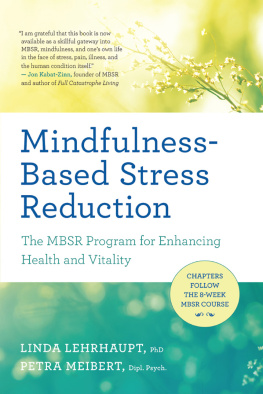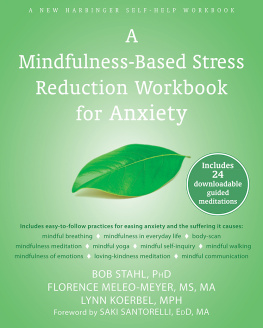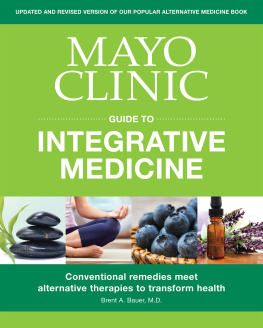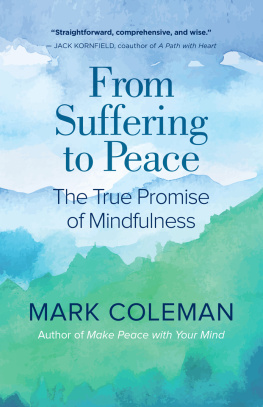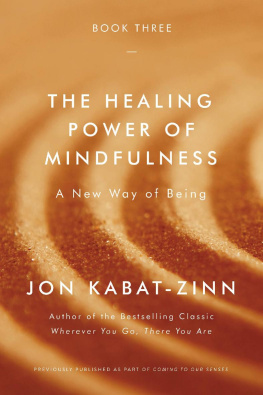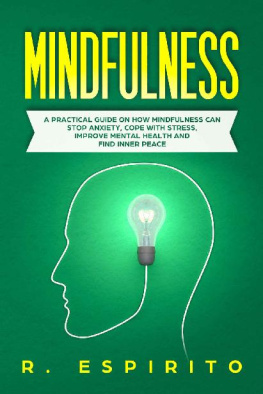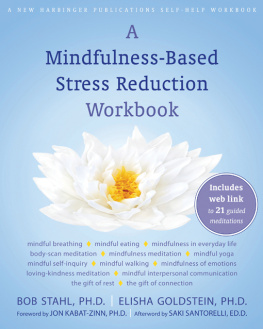Acknowledgments
R ECOGNITION OF THE interdependent nature of our existence is easily overlooked in the press of everyday life. In my attempts to honor the actuality of this interconnectedness, writing these acknowledgments has been instructional, a powerful reminder to me of the scores of people who have contributed directly and indirectly to this book. I wish to bow to the force of their presence in my life.
I thank Jon Kabat-Zinn, Ph.D., the founder of the Stress Reduction Clinic and the executive director of the Center for Mindfulness in Medicine, Health Care, and Society at the University of Massachusetts Medical School. Since 1981, he has been my boss, mentor, colleague, teaching partner, and most fundamentally a friend and fellow companion on the inner journey from which this book has arisen. Trained in both the basic and contemplative sciences, his commitment to the joining of inner and outer, spirit and matter, form and formlessness, has had a profound effect in my life and in the worlds of medicine and health care. For his vision, wisdom, wit, and friendship, I am forever grateful.
I wish to thank Judith K. Ockene, Ph.D., director of the division of Preventive and Behavioral Medicine in the Department of Medicine at the University of Massachusetts Medical School, for her encouragement and open-mindedness. I have learned much from her during the last fifteen years and she has given me ample room to grow into what is mine to do.
I thank the 1,400 physicians in central Massachusetts and the surrounding New England region who have referred their patients to the Stress Reduction Clinic and the far smaller cadre of these physicians with whom I work more closely at UMass Memorial Health Care. In particular, I wish to express my gratitude to John Moynahan, M.D.; John Zawacki, M.D.; Sarah Stone, M.D.; David Clive, M.D.; Ira Ockene, M.D.; David Giansiracusa, M.D.; David Hatem, M.D.; Ed Landeau, M.D.; Andy Cohen, M.D.; Ilia Shlimak, M.D.; Bill Damon, M.D.; Lynn Manfred, M.D.; and Mai-Lan Rogoff, M.D. Their dedication to educating the next generation of physicians, to engaging in patient-centered care, and going the extra mile in the service of those whom they serve remains for me a wellspring of inspiration and a quiet source of pride. In addition, I wish to express my gratitude to Marty Young, Ph.D.; Majorie Clay, Ph.D.; Michael Wertheimer, M.D.; and H. Brownell Wheeler, M.D., for their presence and support.
My teaching colleagues in the Stress Reduction Clinic have been unflagging sources of inspiration and encouragement. I cannot imagine a finer group of people to work with. I wish to thank Ferris Urbanowski, M.A., for her unbounded radiance and her enthusiasm and willingness to read and reread drafts of the manuscriptand, most of all, for her unwavering attention to and insights about the relational aspects of mindfulness and the healing encounter. I thank Elana Rosenbaum, L.I.C.S.W., for her huge heart, undying courage, and capacity to stand inside the truth of her own experience; Pamela Erdmann, M.Ed., for her honesty, integrity, and dedication to teaching mindfulness in the Massachusetts prison system; Florence Meyer, M.A., M.S., for her listening, her embodiment of spaciousness and safety so beautifully evidenced in the classroom, and for her detailed feedback about an early draft of the manuscript; Melissa Blacker for the depth of her Zen practice and its sensitive, playful expression in her work; Fernando de Torrijos for his compassionate heart, gentlemanly manner, and breadth of knowledge about the contemplative traditions, and more so, for he and Melissas shared commitment to bringing the heart of mindfulness practice to low-income, medically underserved, inner-city residents in Worcester, Massachusetts.
My deep appreciation goes to Larry Horwitz, M.B.A., for his dharmically oriented organizational acumen and for our evolving friendship; to Anne Skillings, M.S., for her quick mind, longstanding attention to our research, and capacity to skillfully play a hundred roles; to Leigh Emery, R.N., M.S., for her administrative vision and the richness of her poetry; and to Michael Bratt, Ph.D., for his enthusiasm for mindfulness practice, his dedication to the clinics research endeavors, and his capacity to bring together a research team. I give thanks to Carol Lewis, Sylvia Ciarlo, Roberta Lewis, Leslie Lynch, Norma Rosiello, and, most recently, Jean Baril and Carmen Torres for taking responsibility for the day-today operation of the clinic while actively participating in shaping the unfolding vision of the Center for Mindfulness in Medicine, Health Care, and Society.
This book would not have been possible without the ten thousand patients who have participated in the Stress Reduction Clinic since 1979 and who decided to roll up their sleeves and take up the practice of mindfulness as a way of learning to work with stress, pain, and illness. Their presence in my life has been nothing short of transformative. I pray that I have done them justice in attempting to capture the actuality of their lives and their efforts.
I am indebted to my wife, Rachmana, and my two daughters, Chalice and Felice. While I was writing this book, they generously offered me the gifts of time and space as well as keen eyes and an uncanny capacity for directness and clarity. Their support and love are a blessing to me. I thank my parents, Rose and Fred Santorelli, for all that they have given to me over the years and my sister, Rosanne, for her ongoing efforts to meet the world through her heart. On the other side of the family, my in-laws, Doug and Pearl Robinson, have taught me much. Pearls persistent intention to steer her own life course has helped me to better understand some of my patients strong desires to do the same; and Dougs quick smile, quiet knowing, and innate sense of telling the right story at just the right time are qualities to which I aspire.
I thank Stephan Rechtschaffen, M.D., for his friendship and for offering me a clinical position in the nascent field of mind body medicine back in 1980. Many thanks to Monica Faulkner for her early encouragement and steadfast support. I am grateful for the friendship of David Weinberg, a fine mindfulness-based stress reduction teacher living in Berkeley, California, and his wife, Karen Elliot, who provided me a warm and caring shelter during a particularly difficult period of my life while I was writing this book. Many thanks to Bob Stahl, Ph.D., Patrick Thornton, Ph.D., and Amy Saltzman, M.D., for helping to anchor, with maturity and mastery, the unfolding of a mindfulness-based stress reduction teachers network in the San Francisco Bay Area. My gratitude to Elizabeth Lesser for the sweetness of our friendship and our teaching forays into quiet mind/open heart.
I wish to thank the thousands of health professionals who have participated in our Professional Education and Development Programs at the clinic or who have attended our residential retreat/training programs in different parts of the country. The presence, energy, and courage you directed toward looking into and speaking openly about your own woundedness, about your original calling to be of service in medicine and health care, and your longing for more authentic, less time-bound relationships with your patients have become an enfolded part of my own life. The traces of your presence run like a river through this book.
In a similar vein, I offer thanks to the first-and second-year medical students with whom I have worked closely during the last twelve years. Your vigilant attention to what first called you to medicine and the anxiety, pain, and indignation youve expressed when facing the possibility of having that calling diminished in the rush of medical education is a mark of your dignity. I am heartened that you honor your calling in such a manner; your dedication is a consistent reminder to me of my own vocation.


